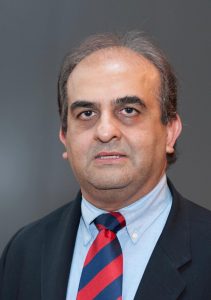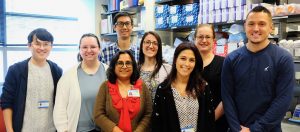ROHHAD Research 2019/2020 Meet the Teams
We are excited to share with you all that the process of awarding funding for ROHHAD research in 2019/2020 is almost complete and we are incredibly happy to introduce too you all the ROHHAD Research Teams who will be undertaking the chosen funded projects that were successful in this round of funding.
The charity received four proposals in total from four different teams of researchers across the globe, all of which met our funding criteria. Each proposal for funding is incredibly exciting and offers enormous potential to help the medical industry unlock some of the mysteries around ROHHAD Syndrome.
Idealistically the charity would fully fund all of the proposed research projects but regret that we are unable to fund all of the proposals at this point in time due to financial constraints. The charity however are fully committed to raising the funds necessary to enable the current research projects to be completed. This requires us to double the £300,000.00 already raised to date.
A few months ago, after careful consideration, peer review and following our ROHHAD Research strategy; the charity board offered full funding to one of the teams who applied and one years funding to two of the teams who applied. At this stage the full funding we had available at the time to allocate for 2019/2020 was £275,000.00 and this will soon be transferred to the 3 teams we offered grants too. We also share below a little about their hypothesis and some of the science behind the research they will undertake.
For those children diagnosed with ROHHAD Syndrome and their families who wish to be involved directly in the ROHHAD Research projects below please contact the charity directly for further information.
As always our mission remains steadfast to find a cure and we believe that the projects we will be funding and the teams we will be working with will help us understand, ROHHAD better and discover the cause of this incredibly rare disease. Once we understand and know what causes ROHHAD Syndrome, then the research teams can begin to work on improving treatments, quality and quantity of life for the children affected and one day lead us to a cure.
Thank you to everyone who has supported our charity and donated funds to allow us to release such a substantial grant. We have so much more to do and our hard work is only just beginning, we hope we can continue to rely on your support as we cannot do it without YOU! Together we will make a difference and find a cure.
ROHHAD Research Team 1 (Funding Contract Complete, Funds will be released for the first year of this project on the 4th of November 2019)
The Tooth Fairy Project
Our International Consortium for ROHHAD Research, established in 2013, is a collaboration with strategically diverse expertise focused on understanding the cause of ROHHAD. Through work conducted by our team and others, evidence has emerged suggesting ROHHAD may be caused by a change to a small group of cells in the patient’s body known as neural crest cells. Neural crest cells are unfortunately very difficult to collect and study without invasive procedures, and thus have not been available for previous ROHHAD research. However, exciting recent advances have allowed neural crest cells to be collected from removed teeth (e.g., lost baby teeth or removed wisdom teeth).
Recognizing the potential impact of this advance as a unique opportunity for ROHHAD research, we have aligned with one of the world’s leading experts in this technique (Dr. Larry Reiter). With this cutting-edge technology, we will have an accessible source of neural crest cells for ROHHAD research for the first time. Using these cells, we can study neurons obtained directly from ROHHAD patients, and compare these to the same cells from non-ROHHAD patients. This will allow us to see what is different about these cells in ROHHAD patients, and to determine what might be causing these differences (and thus, what might be causing this disease). This bank of ROHHAD neural crest cells will be an invaluable resource not only for this research project, but also for future research projects by our own as well as the entire ROHHAD research community.
By studying the specific cell type believed to underlie ROHHAD, something that has never been attempted before, this project represents an exciting opportunity to advance understanding of this disease. Through the generous support of the ROHHAD Association, we will pair recent findings by our ROHHAD Consortium with cutting-edge advances and expertise in cellular modeling, offering a singular opportunity to advance research into the cause and consequences of ROHHAD at the cellular level.
How can you help? If your child with ROHHAD is losing baby teeth, or if they plan to have any teeth taken out please email [email protected] and we will send you a tooth kit in advance.
Participants:
Ann & Robert H. Lurie Children’s Hospital of Chicago, Stanley Manne Children’s Research Institute, and Northwestern University Feinberg School of Medicine
PI: Debra E. Weese-Mayer, MD
Co-I Casey M. Rand, BS, CCRP
University of Tennessee Health Science Center
Site PI: Lawrence T. Reiter, PhD
Alberta Children’s Hospital Research Institute and Cumming School of Medicine, and University of Calgary
Site PI: Kyle C. Kurek, MD
Co-I Torben Bech-Hansen, PhD
Co-I Sarah F. Barclay, PhD
ROHHAD Research Team 2 (funding contract expected to complete before year end 2019)
Mehul Dattani is Professor of Paediatric Endocrinology based at Great Ormond Street Hospital and the UCL GOS Institute of Child Health, London. He has established collaboration with researchers investigating the genetic basis of rare disease (GOSGENE, led by Dr. Dan Kelberman), and with Professor John Anderson, who is a Professor of Paediatric Oncology (Cancer medicine) at UCL GOS ICH. Other members of the team include Professor Mohammad Maghnie, Consultant Paediatric Endocrinologist at the Istituto Giannina Gaslini, Italy and Dr. Guftar Shaikh, Consultant Paediatric Endocrinologist at Royal Hospital for Sick Children, Glasgow. The team are currently looking after patients with ROHHAD syndrome, and have been inspired by the courage of the patients who live with ROHHAD syndrome to the point that they wish to perform research that will shed light on why this rare condition occurs, and to devise new treatments that could be used to treat the disease and improve the quality of life of young people with the condition.
Rapid-onset obesity with hypoventilation, hypothalamic, autonomic dysregulation, and neuroendocrine tumour(ROHHAD-NET) is a rare (<150 cases reported) syndrome associated with significant ill health (morbidity). The condition can occur without the presence of tumours, when it is referred to as ROHHAD syndrome. Patients with the condition usually have abnormal function of the hypothalamus. The hypothalamus is a tiny structure in the brain which is difficult to see on a brain scan. Despite its small size, it controls many critical body functions such as appetite and weight, metabolism, and thirst. It also controls body temperature. It controls the way the pituitary gland works as well. The pituitary gland is often called the “master gland” and controls how a child grows and develops by producing several very important hormones. Children with abnormal hypothalamic function often have an excessive appetite (hyperphagia) and early-onset rapidly progressingobesity, altered breathing patterns, abnormal temperature regulation, behavioural disorders, fits, and excessive sleeping. They may grow slowly, and they may have dangerously high or low concentrations of salt as they cannot control their thirst and water balance.
To date, the cause of this unusual condition is not known. The condition can be difficult to diagnose as it is rare and highly variable between affected children. Identification of the cause of the condition might help to develop a diagnostic test that might then allow more rapid diagnosis and potentially new ways of treating the condition.
In some families, more than one family member with the condition have been reported, suggesting a possible genetic basis to the condition. To date, genetic studies have not identified a single cause of the condition. Our study aims to obtain clinical information about the problems that patients with this condition face from European patients with this rare condition, through a Registry created with the ENDO-ERN initiative, which aims to improve the lives of patients with rare endocrine conditions. We have recently used new MRI brain scanning methods to visualize the hypothalamus, and we believe that we can now identify abnormalities in this structure for the first time using MRI. Our genetic studies have also identified genetic changes (mutations) in various chemical pathways that are important for normal brain function. We believe that these may be contributing to the clinical symptoms present in patients with ROHHAD syndrome. Finally, if we can prove that these genetic changes are important for the causation of ROHHAD syndrome, we will then be able to start designing novel treatments that will help patients with ROHHAD syndrome.To participate in this research,
please contact Professor Mehul Dattani and his team at the UCL GOS Institute of Child Health ([email protected]).
 Principal Investigator Professor Mehul Dattani
Principal Investigator Professor Mehul Dattani
ROHHAD Research Team 3 (funding contract expected to complete before the year end)
Integrated whole genome and transcriptome sequencing to identify the etiology of ROHHAD syndrome.
This study is jointly performed in the laboratories of Dr. Vidhu Thaker from the Division of Molecular Genetics, Department of Pediatrics and Dr. Claudia Doege from the Department of Pathology and Cell Biology at Columbia University.
We are looking to identify the functional changes in the hypothalamus that may be responsible for the characteristic clinical features of ROHHAD syndrome. We will use the blood cells from children with ROHHAD syndrome and their unaffected parents to generate stem cells. With regulatory factors, these stem cells will be reprogrammed to make hypothalamic neurons. We will perform RNA-sequencing study of the patient-specific cells and compare their profile to that of their parents and controls to look for differences in the RNA expression. If we identify any differences in gene expression in the children compared to unaffected individuals, we will compare it to their DNA to understand if the identified changes are responsible for the disease. Our hope is that better characterization of such changes will help solve the mystery of ROHHAD syndrome.
The study is approved by Columbia University Institutional Review Board, and we are hoping to collect samples from children with ROHHAD syndrome and their families for this study.
More information can be found here: CLICK HERE
Investigator: Vidhu Thaker, MD. Assistant Professor of Pediatrics
Email: [email protected]
Research Coordinator: Cecilia Sena
Email: [email protected]
Phone: 212-305-6836
Seen in the picture are (L to R):
Yanjun Xu, PhD Postdoctoral scientist
Cecilia Sena, BA, Research Coordinator
Zhangji Dong, PhD, Postdoctoral scientist
Vidhu Thaker, MD, Assistant Professor
Maria De Rosa, PhD, Postdoctoral scientist
Grazia Iannello, PhD, Postdoctoral scientist
Claudia Doege, MD, Assistant Professor
Rick Rausch, BS, Research Technician<



